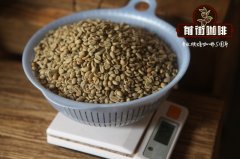Coffee cultivation of Fedecocagua Cooperative in Guatemala _ Fair Trade Coffee beans in Guatemala

Professional coffee knowledge exchange more coffee bean information please follow the coffee workshop (Wechat official account cafe_style)
Guatemala is located in Central America, bordering Mexico to the north, with a population of 15 million. With a supple and thick taste, Guatemalan coffee is an entry for many people to get in touch with individual coffee, and it is also a favorite source of beans for many chain coffee brands. Many raw bean merchants buy coffee beans from the FEDECOCAGUA cooperative in Guatemala and have a lot of stable supporters.
Founded in 1969, the FEDECOCAGUA Cooperative has 3726 Fairtrade members. FEDECOCAGUA provides members with a range of services, including access to credit programs, technical support, transportation, warehousing and the purchase, processing and export of member coffee beans. The commercialization of coffee production means that farmers receive a higher price than they sell to middlemen, and organically certified mentoring programs have been established.
Coffee is the main cash crop for local farmers, accounting for 90% of their income. The average farm area is about 10 hectares. About 3.2 hectares of land is used for coffee production, while other land is planted with shade plants or crops such as cocoa, bananas and vegetables. 100% of the local coffee trees are planted in shade, so they have large grains, high sweetness and high quality.
70 per cent of FEDECOCAGUA members are Maya indigenous people living in remote mountainous areas, where economic conditions and infrastructure are generally poor, particularly roads, water and electricity, communications, health and education. In order to improve the lives of local residents, FEDECOCAGUA has used the Fair Trade Fund to do several infrastructure projects: setting up a small clinic and installing a set of water purification equipment for the clinic. Repairing the roof of a school can prevent dampness. Improve mountain roads, purchase additional transport vehicles, and transport agricultural products in a more efficient and proper manner.
GeradodeLeon, a business manager who has worked for the cooperative for 30 years, said that the FEDECOCAGUA cooperative was established in 1969 with the assistance of the Dutch non-profit organization SOS Wereldhandel. Only with the help of foreign organizations can local farmers get rid of their dependence on purchasers, better understand the information and prices of the coffee market, sell coffee directly to Europe, and get a reasonable reward. The original goal of the co-operative was to "create better market opportunities for small coffee producers and improve the living standards of families; to achieve this goal through teamwork and innovation, and to practice the principles of social responsibility and respect for nature." In addition, FEDECOCAGUA is also committed to meeting customers' demand for quality coffee. "
Over the past 40 years, as a result of the efforts of the co-operatives, great changes have taken place in the local society. Coffee farmers are no longer synonymous with poverty, there is no longer a large loss of young people, and young people are willing to continue coffee farming. Even during the growing season, it will attract temporary workers from other places to work. In addition, women are also more and more involved in cooperatives and are also taking up leadership jobs.
END
Important Notice :
前街咖啡 FrontStreet Coffee has moved to new addredd:
FrontStreet Coffee Address: 315,Donghua East Road,GuangZhou
Tel:020 38364473
- Prev

What kind of coffee is recommended in Guatemala? 2018 Guatemala Incht Manor bid for Pacamara Day
Professional coffee knowledge exchange more coffee bean information please follow Coffee Workshop (Wechat official account cafe_style) 2018 Guatemala _ Incht Manor bidding lot _ Pakamara _ Sun El-04 2018 Guatemala El Injerto Estate El-04 Pacamara-Las Milpas- Patagonia Natural and Emerald Manor are well-known for a century.
- Next

Guatemala COE Coffee-Storm Manor Zhuoyue Cup winning beans _ Guatemalan Coffee Variety introduction
Professional coffee knowledge exchange more coffee bean information please follow the coffee workshop (Wechat official account cafe_style) Cup Of Excellent (referred to as COE), similar to tea or French wine competition, is an annual coffee competition held in many coffee-producing countries to identify high-quality coffee, organized by the Coffee Excellence Alliance (Alliance for Coffe)
Related
- Detailed explanation of Jadeite planting Land in Panamanian Jadeite Manor introduction to the grading system of Jadeite competitive bidding, Red bid, Green bid and Rose Summer
- Story of Coffee planting in Brenka region of Costa Rica Stonehenge Manor anaerobic heavy honey treatment of flavor mouth
- What's on the barrel of Blue Mountain Coffee beans?
- Can American coffee also pull flowers? How to use hot American style to pull out a good-looking pattern?
- Can you make a cold extract with coffee beans? What is the right proportion for cold-extracted coffee formula?
- Indonesian PWN Gold Mandrine Coffee Origin Features Flavor How to Chong? Mandolin coffee is American.
- A brief introduction to the flavor characteristics of Brazilian yellow bourbon coffee beans
- What is the effect of different water quality on the flavor of cold-extracted coffee? What kind of water is best for brewing coffee?
- Why do you think of Rose Summer whenever you mention Panamanian coffee?
- Introduction to the characteristics of authentic blue mountain coffee bean producing areas? What is the CIB Coffee Authority in Jamaica?

